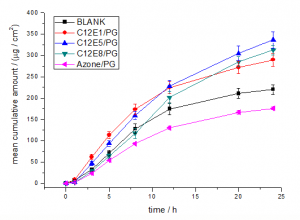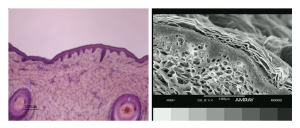Surfactants as Penetration Enhancers for Transdermal Drug Delivery of Model Drugs
The objectives of this study are the development of drug-loaded hydrogels suitable for transdermal drug delivery and the evaluation of the (in vitro) efficacy of various cationic gemini C12 surfactants and non ionic polyether monohydroxyl C12 surfactants as permeation enhancers. These studies assess the enhancement using surfactants alone or in combination with iontophoresis, for various model drugs, across dermatomed porcine or human skin. Caffeine, ketoprofen, lidocaine HCl, ondansetron HCl and diltiazem HCl are examples of model drugs used in this study, comprising drugs with different physico-chemical properties and belonging to different therapeutic categories.
The effects on the skin of these permeation enhancers were monitored by differential scanning calorimetry (DSC), light and scanning electron microscopy (SEM) studies. Cytotoxicity studies (MTS assay) in human epidermal keratinocytes (HEK) and in human dermal fibroblasts (HDF) were additionally carried out to evaluate potential toxic/irritant effects of the enhancers directly on the cells.
Results obtained are promising and show that these penetration enhancers, especially in combination with iontophoresis, can significantly increase the amount of drugs delivered across the skin, without causing any major irritation.
Funding Source: Portuguese Foundation for Science and Technology (FCT, Lisbon, Portugal) ref: SFRH/BD/30537/2006.

